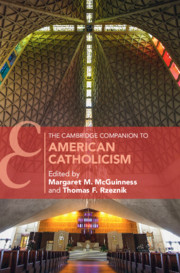Book contents
- The Cambridge Companion to American Catholicism
- Cambridge Companions to Religion
- The Cambridge Companion to American Catholicism
- Copyright page
- Contents
- Contributors
- Introduction
- Part I Historical Overview
- Part II Catholic Life and Culture
- Part III The Many Faces of Catholicism
- 14 American Catholic Laywomen and Feminism
- 15 Black Catholics
- 16 Latinx Catholicism
- 17 Asian-American Catholics
- 18 Cultural Catholicism
- Part IV Conclusion
- Index
- Series page
- References
16 - Latinx Catholicism
from Part III - The Many Faces of Catholicism
Published online by Cambridge University Press: 27 May 2021
- The Cambridge Companion to American Catholicism
- Cambridge Companions to Religion
- The Cambridge Companion to American Catholicism
- Copyright page
- Contents
- Contributors
- Introduction
- Part I Historical Overview
- Part II Catholic Life and Culture
- Part III The Many Faces of Catholicism
- 14 American Catholic Laywomen and Feminism
- 15 Black Catholics
- 16 Latinx Catholicism
- 17 Asian-American Catholics
- 18 Cultural Catholicism
- Part IV Conclusion
- Index
- Series page
- References
Summary
For a community as diverse as those of Latin American and Caribbean descent living in the United States, finding an appropriate term that encapsulates all of its members is a tremendous challenge. The terms Hispanic or Latino/a are often used interchangeably for this community, yet they do not fully reflect the complicated history of the population. Two additional terms, important to reflections on community identity, include mestizaje and mulatez. Mestizaje refers to the mixing of Spanish and indigenous heritage, while mulatez, the mixing of Spanish and African heritage, which is also part of the Latin American story. Both terms remain contested and have been explored in detail by community theologians such as Virgilio Elizondo, Michelle Gonzalez, Jorge Aquino, Nestor Medina, and Miguel De La Torre. Markers such as race and class play a critical role in understanding the history and intricacy of these terms, too much to tackle in this space. To complicate matters further, many people forgo the terms Hispanic or Latino all together and self-identify by particular nationality, calling themselves “Mexican,” “Puerto Rican,” or “Ecuadorian,” or by variations born in the US context such as “Guatemalan-American,” “Chicana,” or “Nuyorican.”
- Type
- Chapter
- Information
- The Cambridge Companion to American Catholicism , pp. 288 - 306Publisher: Cambridge University PressPrint publication year: 2021

